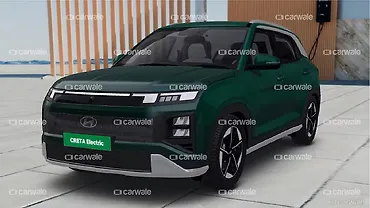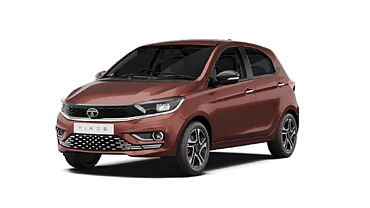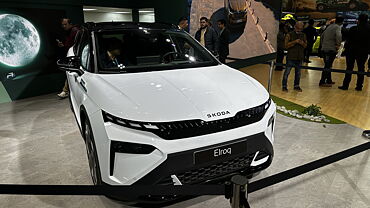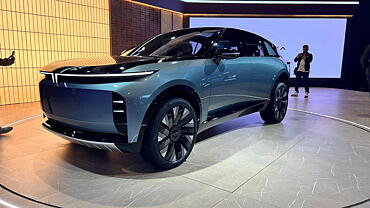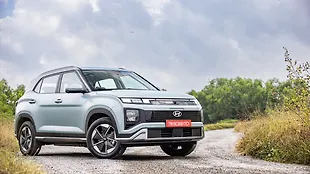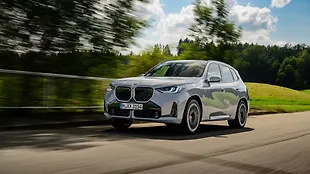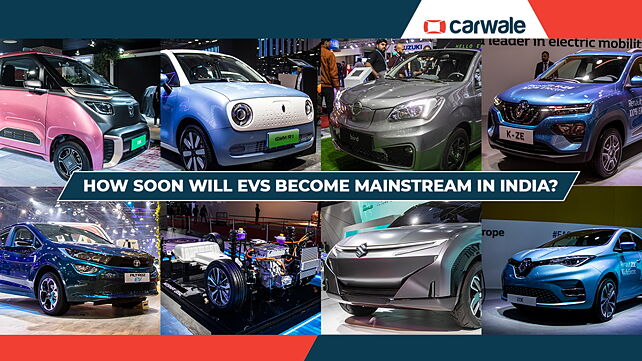
If you looked at the displays and listened to the speakers at the Auto Expo 2020, you would be under the impression that EVs would populate our roads very soon. From concepts like Maruti’s Futuro-e concept to Renault’s production-ready K-ZE and EVs of all shapes and sizes, the takeaway from the Auto Expo would seem to be that EVs are here now and the age of the internal combustion engine are over - especially in the Indian context.

Sure, EVs are becoming more affordable by the month because of a combination of factors. The looming threat of lower demand for ICE (internal combustion engine)-powered cars due to introduction of tougher emission norms, increased consumer awareness about environmental pollution, government schemes demanding a shift to greener forms of transport and improved technology which is also becoming more affordable to produce are all slowly but steadily helping the adoption of electric personal mobility. But, how soon can all-electric cars become mainstream in India?
EVs on sale right now

A slew of launches in the past year has added three important cars to the EV line-up available for customers in India - the Tata Nexon EV, the MG ZS EV and the Hyundai Kona Electric (even though it has been officially launched at the Auto Expo 2020, the Mahindra eKUV100 doesn’t count as it will be available only in 2021). That takes the total number of all-electric cars available to you and me to… four.
The most affordable of these, the Mahindra eVerito, is priced at Rs 9.13 lakh, ex-showroom Delhi. This is in spite of reduced GST on EVs and incentives through the government’s FAME 2 scheme. This high price point automatically makes EVs out of reach for almost half the car buyers in India - just over one lakh customers every month! Unless the cost of EVs are brought down to at least match the top-spec variants of entry-level hatchbacks, which is about Rs 4 lakh ex-showroom, hopes of mass adoption will remain a pipe dream.
Upcoming EVs

More EVs are in the pipeline, here’s a list with their estimated launch time frame and expected ex-showroom price:
Audi e-tron - September 2020 at approximately Rs 1.5 crore
Jaguar E-Pace - Late 2020 at approximately Rs 50 lakh
Nissan Leaf EV - Late 2020 at approximately Rs 35 lakh
Porsche Taycan - Late 2020 at approximately Rs 4 crore
Mercedes-Benz EQC - 2021 at approximately Rs 80 lakh
Mahindra eKUV100 - 2021 at approximately Rs 9 lakh
Haima E1 - 2021 at approximately under Rs 10 lakh
GWM R1 - 2021 at approximately under Rs 10 lakh

From the list above, it is clear that manufacturers prefer a top-down approach to launching all-electric cars in India. Low volumes mean low risk, targeting customers who will use them as a second car rather than their only mode of transport - and potentially choosing an ICE-powered car instead if their demands are not met. Manufacturers need more incentives, apart from government diktats, to consider spending crore in developing and manufacturing EVs on similar scale as ICE-powered mass-market cars.
Range anxiety
The issue of range on a single charge remains a bother. Here’s a table with the claimed range of each all-electric car on sale in India and their corresponding asking price.
| Car Name | Claimed range per charge | Price (ex-showroom Delhi) |
| Mahindra eVerito | 181km | Rs 9.13 lakh |
| Tata Nexon EV | 312km | Rs 13.99 lakh |
| MG ZS EV | 340km | Rs 20.88 lakh |
| Hyundai Kona Electric | 453km | Rs 23.72 lakh |
The claimed range figures need to be taken with a grain of salt, since they are achieved in perfect driving conditions rarely encountered outside of the ARAI testing facility. While almost nobody would need a 200km+ range for their daily commutes, a 300km+ range definitely makes driving less stressful. The key for mass-adoption of EVs will require compact cars, priced under Rs 10 lakh to have at least 300km of range on a single charge.
Charging problem

Range anxiety could be addressed by having a vast network of charging stations. This would reduce the need for large, and more expensive, batteries. Smaller batteries would also lead to lighter cars which wouldn’t need too powerful, battery draining motors to move them. All EVs sold in India are offered with a home charging station free of cost, but installation may be a problem if one lives in an apartment or in a rented property. Setting up a charging point at one’s workplace may also be not always possible/welcome.
Relying on a charging network accessible to the public is also not very feasible right now if you live outside the major metropolitan cities. Depending on who you ask, there are only around 500 public charging stations in the country with varying charging capacities and charger types.

Low-cost charging solutions (such as the recently announced Rs 10,000 Kirana Charzer by FAE Bikes) could help propagate more charging points in the cities, but regulations on parking spots and charging costs are yet to be drafted. Tie-ups with existing fuel stations on the highways could be a quick way to add electric charging stations for convenient intercity travels in an EV.
Taking charge

Unfortunately, a ‘chicken or egg’ situation regarding the implementation of an expansive network allowing seamless intercity travel is playing out. Charging infrastructure providers are waiting for more car manufacturers to launch EVs before setting up the expensive infrastructure. On the flip side, the manufacturers want the charging infrastructure to be set up before they gamble with launching more all-electric cars. While the government has announced setting up 2600 charging stations by 2021, these will be limited around major cities and some of the more popular highways in the country.
Policies on how the thousands of electric charging stations will be powered have not been set either. Only 17 percent of all the electricity generated in India comes from renewable sources. Does it make sense to use low-emission EVs if they are being powered by electricity sourced from coal-fired stations?
Even 2030 seems too soon

The large scale adoption of all-electric cars for personal mobility still hinges on multiple factors - cars with 300km range costing less than Rs 10 lakh, an aggressive push towards setting up the infrastructure required to easily charge lakh of new EVs and setting up policies on charging stations, power generation, charging costs, disposal/reuse of depleted battery packs.
So, how soon can all-electric cars become mainstream in India? For now, your guess is as good as ours. As things stand right now, the government’s goal of having only electric vehicles on Indian roads by 2030 seems far-fetched.


